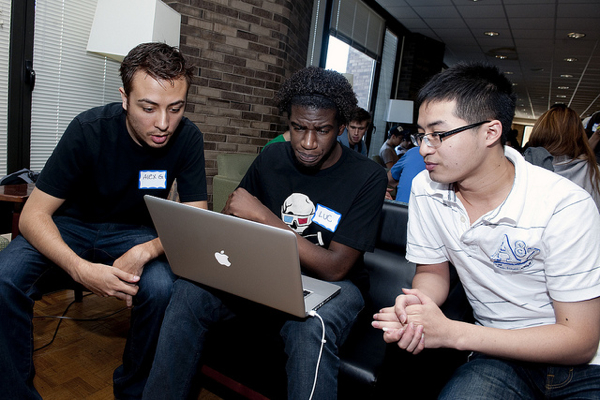
Graduates preparing to take the leap into employment face tough competition, and it’s imperative to make an outstanding case for yourself with every job application. That being said, good personal branding online can go a long way.
As you probably know, it’s not uncommon for employers and recruiters to perform a quick Google search upon receiving an application. Unsurprisingly, this search can point employers in the direction of social media accounts. And so, whatever the results, you want to ensure that nothing will put them off hiring you as an intern, or a long-term employee. If anything, you want to ensure anything that does show up on said Google search paints you in the best possible light.
To put it simply, building a great personal brand online ensures that others view you in a way that you wish to be seen. A strong personal brand online can, for instance, show potential employers you’re capable, driven and personable. It can demonstrate your experience, and give you the space to show off a bit of personality. It's a brilliant way to beat that dreaded Google search and make it work for you.
Even better, it's super easy to start building your online brand. Here's five steps to get you started.
1. Google yourself
Before you start to craft your personal brand, it’s paramount to get a grip on what your current online footprint looks like. So, Google yourself! See what the search picks up – you might be surprised what it shows up.
Next, if there are any, make a list of the accounts and profiles thrown up by the search. Deactivate dormant or unwanted accounts, and take stock of your active profiles: what needs work?
Take this time to comb through the existing material on the profiles you want to keep. Take the time to limit past posts, or remove anything that doesn’t represent the person you are today - the person you wish to present to potential employers.
.jpg)
2. Play the name game
Now that you’ve condensed and cleaned up your online footprint, it’s time to get a tad technical. For a strong online brand, it’s important that your social media profiles are easy to locate online and that you, as a person, are search engine optimized (SEO is your friend).
To do this, try to ensure that your username is the same across all platforms, and where possible, use your real name. This will make it easier for employers to locate the content that you want them to see.
Next up, make sure your branding on these platforms remains consistent. If you use emojis on one platform, feel free to use them on them all. Use the same image or logo on your profiles. Describe yourself in the same way; if you’re a trainee lawyer with an interest in human rights on Twitter, you better be a trainee lawyer with an interest in human rights on LinkedIn, too. Remember to keep it clean, concise and consistent.
Better yet, link your social media profiles together. On LinkedIn, you can attach your Twitter profile, for instance.

3. Make a digital portfolio
Now, this step might apply better to some more than others. So, if you’re heading into the creative industries, listen up.
Whilst social media platforms can be a great way to connect with others in your industry and share snippets of recent work; employers really want to see the full extent of what you can do. Enter the online portfolio.
An online portfolio could be anything, really: so long as it contains a good insight into the extent of your work. For instance, if you’re an aspiring videographer, make a YouTube account with your best work, and stick a link on your CV. If you’re an aspiring journalist, create a website with a free host, like WordPress, with a few examples of your best work.
The best online portfolios? They reflect the personal brand you’ve created on social media. So, if you’re using a certain colour scheme, cover photo or title over on Instagram, stick it on your online portfolio too. Cross-channel, consistent branding can help potential employers to identify you quickly.
For those looking to get into other industries, a well-crafted LinkedIn profile can do the job. Use your LinkedIn page as an interactive, digital CV. Showcase your qualifications and previous experiences of employment, whether that be paid or voluntary. Where possible, secure written ‘recommendations’ from colleagues or employers as a testament to your talent and professionalism.
Once you’ve created an online portfolio which matches your carefully-curated social media channels, make sure to embed links to those profiles and vice versa. This will make it super easy for a potential employer to navigate from your portfolio to your social media accounts, and back to your portfolio. After all, with a good personal online brand, you’re trying to make it as easy as possible for a potential employer to get a good insight into the person you are.

4. Start interacting
Once all of your social media accounts are in order, start interacting. One of the brilliant things about platforms such as Twitter, for example, is just how open they are. Especially in fields such as journalism and research, you can often find, and interact with, individuals in top positions with a quick search.
Want to show potential employers you’re interested in their field? Interact with industry-specific content and conversations. Share your thoughts, contribute relevant resources or celebrate the work of others. These interactions demonstrate your knowledge and enthusiasm for the industry, and allow you to connect with like-minded people.
Got a specific employer in mind? Interact with their content and employees: they might just remember your name in a big pile of applications.
That being said, don’t go overboard. Ensure that your contributions to online discussions, especially in the professional sphere, are well-informed and relevant. A like here, a post there and a retweet over there will suffice.

5. Be genuine – don’t be afraid to show a bit of personality
When building a personal brand, authenticity is key. Yes! You should want to come across as a brilliant professional candidate. But you should also want to come across as a real person. You know, with interests and hobbies and stuff.
Now, back in stage one, you might have gotten rid of some embarrassing content – no one wants to see old selfies or personal Tumblr accounts. But there’s nothing wrong with adding a pinch of personality into your online feeds. If anything, it allows you to come across more genuine, and that authenticity might just do the trick when it comes to hooking potential employers.
So feel free to mention that you like to play in that sports team in your free time, or that you enjoy a particular genre of music. Having other interests outside of your professional role can only be a good thing.

Liked this article? Check out 6 Ways to Improve Your CV Before You Get to University.